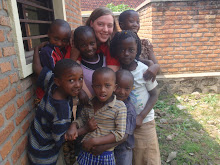As soon as my alarm went off, I knew the day would be different. It was more quiet, more somber, something unspoken was already in the air. We got ready in near silence, exchanging the usual “mwaramutse” and “amakuru” but not with the usual giggles or other pleasantries. I walked to school alone, allowing myself to feel the heaviness in the air. It was eerily quiet as I walked, I noticed the sound of my own footsteps. Despite the late hour the streets were close to empty. There were no motos or cars, very few people were milling around, and stores were shuttered. It was as if the entire country had taken a collective breath in, and was holding it. I passed people, attempted to meet their gaze, understood when I did not, and kept walking. Breakfast also passed in a haze, everyone wanting to say something but not having a clue what, and afraid to say the wrong thing.
It was the morning of April 7th, 16 years to the day after the genocide in Rwanda began.
After breakfast we walked towards the sector office and before we even reached it we were met by the procession. It must have stretched miles, with what seemed like the entire district, at least, in attendance. We joined the masses and slowly dispersed among them, the Americans melting into the Rwandans. We walked in silence, at times holding hands. We felt their emotions, we walked as one.
The march ended at a cemetery where prayers were offered in Kinyarwanda, and then moved to the stadium. There we sat with the blazing sun beating down on us all, and listened; we listened to the testimonies, the speakers, and the songs. There was a moment of silence at noon for all of the lives lost, followed by a speech by President Kagame that was piped over the loudspeakers. Despite the fact that we couldn’t understand what was said or sung, it was impossible to not know what they were saying, what they were feeling. I’ll never forget what I heard and saw. Sobbing, gasping for air, and screaming, at times women were rendered inconsolable. When it became too much they were walked out or in some cases carried. Often kicking, flailing or running, many had lost all ability to contain their emotions or even control of their bodies. Emotion had taken over; grief, sadness, anger and helplessness. It was so difficult to watch, and I found myself with my hand clutched over my mouth, tears streaming down my cheeks as I held my knees to my chest. It’s heartbreaking to know so many people had lost so much, were remembering so much, were trying to forget and move past so much. What do you say to a person who lived through a genocide? What do you say to a person who lost their entire family? What do you say to a nation trying to move forward from something so dark, so evil? Nothing. You can’t say anything, you can’t do anything. I was silent.
This week has been a struggle. We have struggled to comprehend the enormity of what happened in this country in 1994. We have struggled with how to reconcile our own anger over the international community’s response (or rather, lack of response) to what was occurring. We have struggled with hearing the heartbreaking stories of loss and brave stories of survival of many of our Rwandan friends. We have struggled to grasp how despite all they’ve endured they can go on living, in some cases even next to those who did them wrong. But our struggles are nothing compared to theirs. Their strength, compassion, and resolve is awe-inspiring.
Never forget - never forget that it happened, never forget how it happened, never forget why it happened. And never again, never again, let it happen.
Subscribe to:
Post Comments (Atom)
Be the change you want to see in the world.
-Mahatma Gandhi

1 comment:
Amy,
It sounds like an absolutely terrifying experience for both you and the native people of the land. How horrible to have such an aweful anniversary to remember. Now that you have shared this experience with them, I'm sure you will feel even more connected to both the people and the land you now call home for the next two years. My thoughts & prayers are with you.
Post a Comment